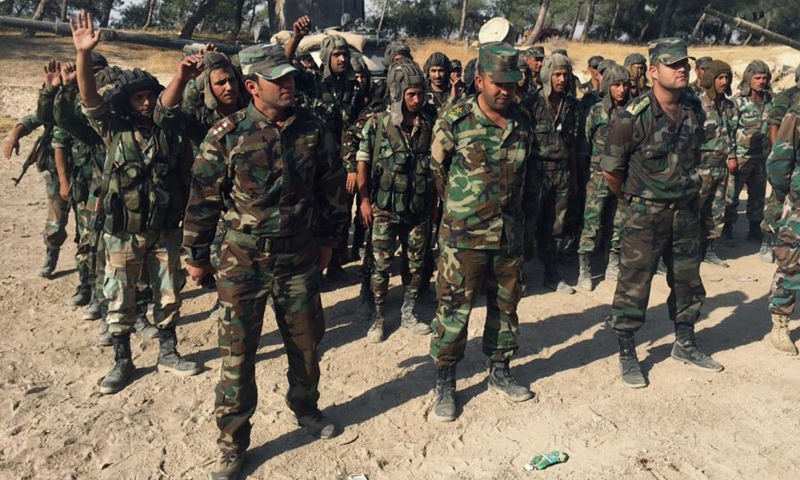



Several Syrian young men are afraid of forced conscription in the army of the Syrian regime, mainly those who opted to stay in the province of Homs rather than being displaced, after the Syrian regime forces and their ally Russia imposed a “ settlement agreement” on the residents of northern rural Homs in May 2018.
Ismael, a young man from the al-Rastan city and a deserter of mandatory enlistment, spoke to Enab Baladi on the condition of anonymity for security reasons, about his hiding for fear of the most recent forced conscription campaign.
Although Ismael and other young men with similar legal situations do not dare to move freely for fear of enlistment, the Syrian regime forces tightened the noose on them even more, according to Ismael.
He confirmed that the military police patrols set up their checkpoints randomly and in an unpredictable way.
The intense presence of the military police patrols increases the chances of arrest in young men who evade military conscription. However, there is still hope for Ismael and other young men with similar situations; money can save them from enlistment.
According to Ismael, young men fleeing the military service can pay an amount of money, which starts at 50 thousand Syrian pounds (SYP- 47 USD).
Dignitaries of rural Homs met the Secretary of “the Arab Socialist Ba’ath Party” division and some heads of security detachments to intercede with the military police station in order to decrease its patrols and checkpoints; however, their calls fell on deaf ears.
Dignitaries and members of al-Rastan and Talbiseh city councils and some prominent figures formed a delegation to negotiate with the regime’s government. The delegation met with officials from the al-Ba’ath Party division in the area, which is responsible for the case of forced enlistment. Nevertheless, a member of the delegation who asked not to be named for security reasons, confirmed to Enab Baladi that the officials of al-Ba’ath Party repudiated any responsibility towards the compulsory military enrolment case.
In the same perspective, the area director and security detachments officials did not respond to the pleads of the delegation and said their job (in reference to the Syrian regime elements) is to arrest young men evading the military service.
They also said they want to “earn a living” which was seen by the delegation member as a sign of approval for the blackmailing of the military police station to the young men in the area.
Nonetheless, the Secretary of al-Ba’ath Party division, the area director, and the heads of the security detachments pledged to the negotiating delegation the prevention of military police from carrying out raids on the residents’ houses. They also called upon the military police to limit its work to patrols and checkpoints.
Despite the officials’ promises, many raids took place last January, according to Abu Mohammad, a resident of Gharanah village in northern rural Homs. Abu Mohammad, who was not fully named for security reasons, gave an example to Enab Baladi about an incident that he himself witnessed.
He said the military police raided one of the houses in the village to arrest a deserter of the military service. The deserter’s family offered to pay 175,000 Syrian Pounds (166 USD) to the officer, but the military police patrol insisted on arresting the young man.
Abu Mohammad added it turned out later that the young man was a volunteer in the Iranian-backed Rapid Intervention Regiment (RIR). Once the young man left service with the RIR, the military police raided his house and drafted him back under mandatory conscription.
The “Settlement” agreement was signed in May 2018, between the opposition factions in northern Homs countryside and the Russian forces who guaranteed the Syrian regime’s commitment to its terms.
The agreement provided for the deportation of the fighting factions that rejected the agreement to northern Syria, which is under the control of the opposition factions. The agreement also stipulated that Jaish al-Tawhid, led by Manhal al-Salouh, would remain in the area. Manhal al-Salouh was the broker of the agreement, in coordination with Syria’s Tomorrow Movement headed by Ahmed al-Jarba.
A few months after the settlement, security measures were tightened in the area in many ways, most notably arrest campaigns, kidnapping operations, and forced enlistment in the military service.
Moreover, months after the agreement, the recruitment division of the regime’s affiliated militias began to attract young people and to encourage members of the “reconciliation” factions to join compulsory military service.
In addition to that, the military police patrols started to set up their checkpoints to capture those wanted for compulsory service. The tightening security measures pushed lots of young men in the northern countryside of Homs to join the Syrian regime forces voluntarily, hoping that they will not be sent to the frontlines.
On 25 August 2018, the Syrian regime transferred 400 fighters from the “Settlement” factions in Homs countryside to Idlib to participate in a military operation. The fighters were members of the “Jaish al-Tawhid” faction, and the regime moved them to the al-Ghab Plain area in western Hama countryside accompanied by the “Tiger Forces.
“Since the beginning of the military campaign launched by the Syrian regime on Idlib and rural Hama in February 2019, the northern countryside of Homs has received at least ten dead people every two weeks. Residents of al-Houla Plain, Talbiseh, and al-Rastan and their surroundings, receive two bodies on average every 15 days according to what was monitored by Enab Baladi.
Nonetheless, the Syrian regime refrains from releasing official statistics or making recognition about the number of people killed on the Idlib and Hama frontlines from the “Settlements” factions. The only fatalities documented are those published either in the local and pro-governmental pages or in the social media pages of the non-official military battalions.
if you think the article contain wrong information or you have additional details Send Correction